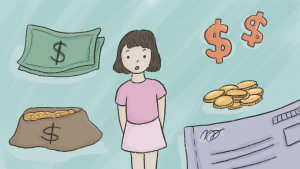
5 Signs that Indicate Your Child May Be Burnt Out

Your child’s grades have been slipping. Homework is difficult and quizzes come back with lots of red marks and low grades. They don’t perform well on quizzes and fail their examinations. Your child puts in all the effort they can muster to understand concepts and answer questions. Yet, the effort doesn’t translate to the desired results.
What happens when your child continually tries but doesn’t do well? Slowly their motivation and drive wanes. Overworking, feeling a lack of control, repeated failure and little joy in their schoolwork are some of a few factors that create fertile breeding ground for stress and anxiety. If left to fester for a prolonged period, burnout can result. Stresses outside of school like having to deal with family issues, can also cause your child to feel overwhelmed and exhausted. For example, PSLE students this year had to deal with a new scoring system on top of sitting for their papers amidst the worsening COVID-19 situation. These types of external stressors are potential sources of anxiety and stress. In this blog, we look at the different symptoms of burnout and how you can spot them early and resolve the situation before it worsens.
1. Feeling disinterested and unengaged
When pushed past their limits, your child might cope by shutting down. A chatty child who usually comes home happy to talk about their day and all they have accomplished, is now sullen, withdrawn and apathetic. Probing is met with monosyllabic answers or shrugs. It seems like your child has lost their drive, motivation and the enthusiasm they usually have for the activities they enjoy.
2. Feeling anxious, irritable and pessimistic
With a loss of joy, motivation and pleasure in their daily activities, they start adopting a negative outlook towards life. If you suggest baking cookies or playing badminton, they might snap and say, “ I don’t feel like it!”. They might be dealing with anxiety or exam stress and this might be their way of expressing how they feel.
3. Starting to procrastinate
A decreased desire and a lack of care for the consequences results in your child putting off homework, assignments and studying for tests. Even with constant reminders, they don’t get started on their tasks, choosing to dawdle, stall and draw out the process.
4. Avoiding social situations
The consequence of burnout can sometimes be depression and feeling like they want to be left alone. Your child might choose to stay in their room when previously, they used to hang around in common areas around the house or linger after dinner. They might push away pre-arranged play dates with friends and cousins or larger family gatherings, saying they’re tired or have too much schoolwork.
5. Feigning sickness
Your child usually loves going to school or engaging in sports and rarely falls sick but suddenly in the last month, he has been telling you he has a stomachache. If school has become a source of stress and anxiety, your kid might be attempting to get out of it. Their illnesses might also be psychosomatic, when mental stresses manifest in physical illness, a self-induced type of sickness. Common physical reactions associated with stress include headaches, chills, stomachaches, nausea and vomiting.
Dealing with your child’s burnout
Uncovering the underlying issue and solving it at the root would help to not just alleviate the symptoms of burnout, but solve deeper issues. Speak to your child, slowly making them comfortable enough to want to open up with you. Help them cope if they fail their examinations. Approaching a child therapist and having your child speak to someone under the context of anonymity, might give them the space to express themselves and release built-up negative emotions.
If it’s a confidence or self-esteem issue resulting in anxiety, stress or lack of motivation, be their mentor and equip them with the skills required to be better at their school subjects or in sports. This boosts their confidence and gently guides them towards seeing themselves in a better light.
Be a source of support for your child
The symptoms of burnout may not be easily recognisable at first and might be overlooked or pass off as tantrums or regular misbehaviour. It’s normal for children to face challenges and hurdles. By teaching them how to persevere and reframing the way they think, they’re in strong positions to weather setbacks. In using effective antidotes to feelings of anxiety or stress – you help your child build better mental health and overcome burnout.

Carelle
Carelle is a teacher who has been through the ups and downs of the teacher and learner life. She wishes for every learner to gain educational satisfaction that will help embody the people they want to be in the future.
Tell Carelle Below What You Think About Her Post!

About FamilyTutor!
FamilyTutor is an established home tuition agency in Singapore! We match suitable home tutors for our clients not just to improve the students' academic grades, but also to build a strong rapport and meaningful relationship with the students and even the their whole family. FamilyTutor put every student in good hands!
If you need an excellent home tutor, feel free to call/WhatsApp us at +65 8777-2168! Our matching service is free!
Related Posts!
Follow Us On Facebook!
Our Service!
- Home Tuition in Singapore
- Home Tutor in Singapore
- Home Tuition Rates in Singapore
- Preschool Home Tuition
- Primary School Home Tuition
- PSLE Home Tuition
- Secondary School Home Tuition
- ITE Home Tuition
- N Level Home Tuition
- JC Home Tuition
- A Level Home Tuition
- Polytechnic Home Tuition
- University Home Tuition
- A-Math Home Tuition
- Biology Home Tuition
- Chemistry Home Tuition
- Chinese Home Tuition
- Economics Home Tuition
- English Home Tuition
- Geography Home Tuition
- H2 Chemistry Home Tuition
- Higher Chinese Home Tuition
- Hindi Home Tuition
- History Home Tuition
- IB Chemistry Home Tuition
- IP Chemistry Home Tuition
- IP Math Home Tuition
- IP Home Tuition
- JC Chemistry Home Tuition
- Literature Home Tuition
- Malay Home Tuition
- Math Home Tuition
- O Level Chemistry Home Tuition
- O Level Math Home Tuition
- O Level Physics Home Tuition
- Online Home Tuition
- Physics Home Tuition
- POA Home Tuition
- Science Home Tuition
- Tamil Home Tuition
Education Levels
National Exams
Math & Science Subjects
Language Subjects
Japanese Tuition
Korean Tuition
German Tuition
Humanities Subjects
Social Studies
Chinese Literature Tuition
About Us
FamilyTutor is an established and the people’s favourite home tuition agency in Singapore! We match a suitable tutor for you not just to improve the student’s grade, but also to build a good rapport and meaningful relationship with the student and even with the student’s whole family! With FamilyTutor, every Singaporean son & daughter is in good hands.
Contact Us
- 8777 2168
- 8777 2168
- Mon-Sun 9am-10pm (Including PH)
- contactus@familytutor.sg
- 17 Petir Road Singapore 678278



